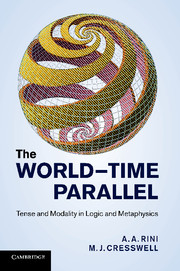Book contents
8 - Time and world quantifiers
from PART II - PREDICATE LOGIC: TENSE AND MODAL
Published online by Cambridge University Press: 05 March 2012
Summary
The first aim of the present chapter is to explain how the extensions to the modal and tense predicate languages that we presented in Chapter 7 amount in power to a language with explicit quantification over times and worlds. A second aim is to explain how such a language is in turn equivalent to a tenseless and non-modal language of the kind referred to on p. 4. As a result, when we make precise the distinction between presentism and eternalism, or the distinction between actualism and possibilism, as presented in Chapter 4, it will become clear why there can be no logical argument to decide the metaphysical debate between them. This chapter can be omitted by those who are prepared to take on trust that these languages do have such power. Suppose that we have a language in which there are variables for moments of time. Let us use the boldface variables t1, t2 and so on to stand for the temporal variables, and t1, t2, etc. to refer to moments of time. So when we say that t refers to t we mean that the temporal variable in the object language refers to the moment of time t. t is a linguistic item, a temporal variable, while t is a time, a part of the physical universe. With this in mind use [t] to mean ‘it is true at t that’, where t refers to t.
Information
- Type
- Chapter
- Information
- The World-Time ParallelTense and Modality in Logic and Metaphysics, pp. 85 - 96Publisher: Cambridge University PressPrint publication year: 2012
